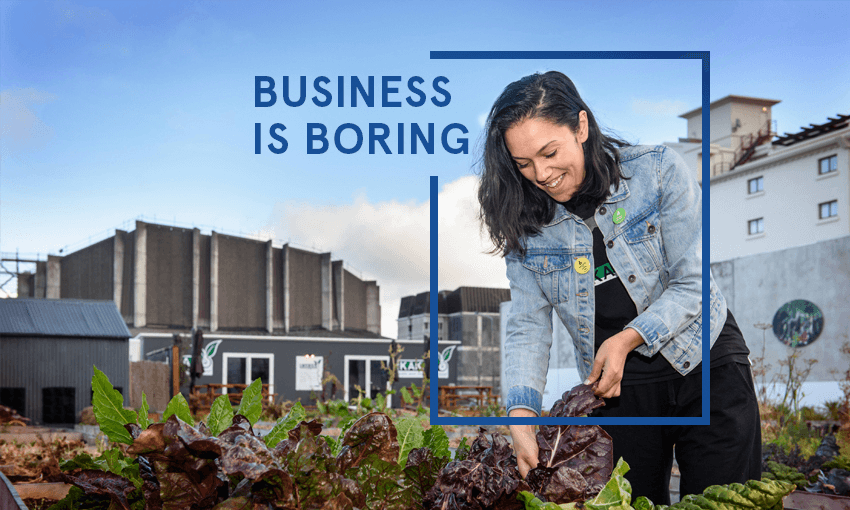Business is Boring is a weekly podcast series presented by The Spinoff in association with Vodafone Xone. Host Simon Pound speaks with innovators and commentators focused on the future of New Zealand, with the interview available as both audio and a transcribed excerpt. This week Simon talks to Jade Temepara about growing a family business from a seed potato.
In the wake of the Christchurch earthquake a local gardener was given a task by her koro. Her grandfather asked her to help keep a potato variety going that had been grown by the family for more than 100 years. The deep connection to growing kai, and the the way it provides and protects kicked off a renewed interest in for Jade Temepara in the power of gardens to anchor and support families.
In addition to being an acclaimed gardener who placed at Ellerslie Flower Show, Jade had been working with families doing it tough and thought she could bring the worlds together. She launched Hand over a Hundy, a concept where a family is given 100 bucks for supplies, seeds and seedlings and a mentor to help them grow seasonal veggies, and the idea being that they then make enough surplus that they can sell that to create another 100 of seed funding and introduce this to another family.
They’ve changed lives up and down the country, and the very shape of Christchurch after the earthquakes where gardening became radical urban reclamation. Today Jade is co-founder of Kākano Cafe and cooking school and garden with a Māori kaupapa and team that is spreading the messages of good health and nutrition and connection with the earth through the community.
Jade joins us now.
Either download (right click to save), have a listen below or via Spotify, subscribe through iTunes (RSS feed) or read on for a transcribed excerpt.
What was it about the experience of gardening with your family that led you to come up with the idea for a charity? What was the thing that made you start Hand over a Hundy?
My family at that time were on one income and we’d bought quite a large property, it had a couple of fruit trees already in it, and I really wanted to turn most of it into food growing, just because I knew how much fresher everything tasted and how much better everything tasted, and I had the opportunity to be able to utilise my own land and so I did and what I realised really soon into planting a large vegetable garden is how much money I was saving.
I was in Ashburton, mid Canterbury, then and I had been working with lots of solo parents and the same theme kept coming up of food availability and affordability. I knew what I was saving with my children was a huge chunk of people’s food budgets or just budgets in general, and so I started looking around to see where we could get resources from, and who would be interested in helping to teach young families to grow food at home.
The concept for Hand Over a Hundy was born in a very organic way with all of the fundamentals that you need for a good garden, land, people, mentors, and community.
Tell me about the response you got from the first people you took the idea to.
We had ten really different families who we sort of piloted the first experience off. We had a really amazing community we put out what we were doing through the local newspaper and said this is what we’re wanting to do, these are some of the goals that we have, to save money, connect the community, show that difference in culture and lifestyles and really mush everyone together.
From the ten families some had lots of children, some had one child, there were separate incomes, there was one income, there were people without families, different cultural needs… everyone was really different but the awesome thing about that experience was we got to really immerse ourselves in our community and see what the needs were.
One family had six children and they spent $50 on seed potatoes for that year and the seed potatoes provided six months of potatoes for that family which is a huge saving when you have that many mouths to feed.
We had another family that were from Nigeria and were finding it quite hard to fit into their community at that time, obviously different climate, foods, culture, every experience was different for them. We knitted them into our wee group of gardeners and they grew $100 worth of tomatoes and chillis and peppers and I said woah, do you not like growing anything else? and they said no, this is the staple of everything that we eat. And I tell you it was like walking into a forest of tomatoes in that place.
That experience has taught me that we are all really different in how we eat and all of those things are different to all of us and that was a part of their cultural integration with our country, was that they still really liked to eat their own food. That was an awesome experience seeing how everyone took to the new project in their own way.
Business is Boring is brought to you by Vodafone Xone, a NZ-based Innovation Lab and Startup Accelerator helping to bring the best startup and corporate ideas global.
